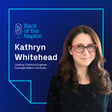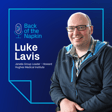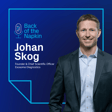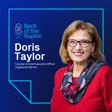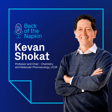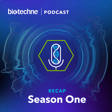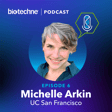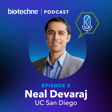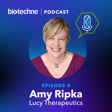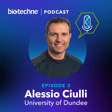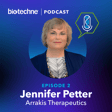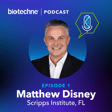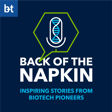The Nature of Discoveries
00:00:03
Speaker
A discovery is said to be an accident meeting a prepared mind, but every story behind a discovery is different.
00:00:11
Speaker
Perhaps the idea is conceived in a light-bulb moment, or a brainstorming session, or captured in scribblings on the back of a napkin.
Introduction to Scientific Pioneers
00:00:19
Speaker
Here, we introduce you to scientific pioneers, taking you beyond their publication and into Innovation Corner to hear the untold stories behind their discoveries. This podcast is brought to you by Biotech, and I'm your host, Alex Maloney.
00:00:37
Speaker
Hello and welcome to the first episode of season two of Back of the Napkin. It is great to be able to bring you a whole new season of this podcast. Thank you for your support and feedback. It's been instrumental in driving this new season forward.
Journey to Boston
00:00:55
Speaker
And I actually got to hop on a plane recently and take a trip over to Boston to record with some fantastic guests for this new season. And one of those you're going to listen
Meet Professor Laura Giesling
00:01:05
Speaker
to today. So let me introduce our first guest, Professor Laura Giesling. Laura is a Novartis Professor of Chemistry at Massachusetts Institute of Technology, MIT.
00:01:19
Speaker
She's authored over 140 peer-reviewed papers, is an inventor on more than 28 US patents, and has been one of the drivers in accelerating this area of chemical biology. Laura is in fact the founding editor of ACS Chemical Biology, a fantastic journal that certainly occupies a lot of my reading time.
00:01:41
Speaker
She even has the OG Twitter or X handle at Chemical Biology, make sure to give her a follow. Laura's research interests broadly fall under the field of glycoscience. This is the study of carbohydrates and how glycans, composed of sugars, interact with proteins and other molecules.
Research on Cell Surface Glycans
00:02:06
Speaker
Specifically Laura's work has focused on cell surface glycans and we talk about this in the episode but if you think of a cell as a peanut M&M, the cell surface glycans are the sugary coating on the outside of these and how they are involved in immunity and development has been fundamental in Laura's research.
00:02:28
Speaker
Laura's interests in sugars also extend to infectious diseases and how these sugars are involved in infection or can even be developed as diagnostic tools. We speak about a lot in this episode from Laura's impressive art collection in her office through her time in science, her discoveries in the areas I've mentioned and importantly we land on the topic of women in science.
Advocacy for Women in Science
00:02:56
Speaker
Laura is not only a proponent but a role model for women in science advocating for equal representation, mentorship and recognition. She reveals some very honest insights into what it's been like being a woman in science and I feel very privileged that we were able to discuss these. And he uses podcasts to call out the norms that have made it so difficult for women pursuing a career in science.
Touring MIT
00:03:22
Speaker
After we hit finish on the episode I was lucky enough to get a guided tour of MIT which was very surreal. I got to see the Infinite Corridor, the Outfinite Corridor, Rub George Eastman's nose for luck and you know what I actually got upgraded on my flight later that day so thank you George.
00:03:45
Speaker
Laura told me some more about her background on the tour as well.
Laura's Academic Journey
00:03:48
Speaker
She didn't get the fast start in life that many in her position have had and she had a very humble upbringing which adds an extra layer of impressiveness to what she has achieved and created. So let's get into it. Welcome to Back of the Nutkin.
00:04:12
Speaker
Hi, Laura. Welcome to Back of the Napkin. Thank you so much for having me here in your fantastic office at MIT. Oh, thanks for the invitation to join you. So Laura, you actually won an award already, which is the most requested guest for this podcast. So it is a real privilege to actually have you here on the podcast. Wow, that's amazing. I had no idea.
00:04:38
Speaker
So we were talking about before we started, but your office is amazing. There's so much amazing artwork scattered around this room. Tell me about this. Do you collect this?
Art and Science
00:04:50
Speaker
like art. And yeah, these are all pieces that I guess they're eclectic. They're things that I just ran into. But I was at UW Madison for a long time and they have a really great printmaking school. And so a lot of the art I first encountered there. So you can see I have an abstract periodic table. That's the one that caught my eye first. I love it.
00:05:17
Speaker
Yeah. And then I have this chemistry Lichtenstein. Wow. So I love it. There's a test tube and there's some Erlen Myers. Yeah. And then I have a lot of fossils.
00:05:33
Speaker
I like them too. When I was a grad student, I didn't have a lot of money growing up. And when I was a grad student, I was very poor. But I was in New York City visiting a friend, and I saw you could buy a fossil for like $25 that was from hundreds of millions of years ago. And I just thought, what a bargain.
00:06:03
Speaker
Yeah, sounds like a great investment. I don't know if it's an investment. I just thought it was so cool. You could buy something that was so old. That's amazing. You can have a little piece of history in your... Exactly. Yeah.
Passion for Nature and Math
00:06:17
Speaker
So let's go back. Tell me about growing up. Where did you grow up? I grew up in a very small town in Wisconsin, Lake Mills. And when I grew up there, it had less than 3,000 people.
00:06:30
Speaker
So my class, I think, it was the biggest class ever at my school. It had 100 people in it. Wow. And what piqued your interest in science? How did you get into science?
00:06:42
Speaker
I don't know if I was really, well, I liked math when I was growing up. Again, a lot of things that we did were not as oriented towards scholastic excellence in any way.
00:07:01
Speaker
I remember being camping and my mom waking me up at four in the morning to watch a Luna Moth hatch outside of our tent. I wasn't very psyched at the time, but it was beautiful. And I did a lot of things like that. I had a backyard that
00:07:23
Speaker
there was right near this pond, and my brother and I would catch tadpoles in a bucket and keep them for a long time and watch them grow up. We left them at my grandmother's house during vacation in an unfortunate time where they all grew legs and hopped out of the bucket, and my grandmother woke up to find all these little tree toads hopping around her kitchen.
00:07:49
Speaker
she was not psyched to take care of our pets after that. Yeah it's like a real fascination with nature then. I guess nature and then um yeah and then I started
00:08:01
Speaker
I mean, I took all the science classes because someone told me, you know, if you like math, maybe you will like science or engineering. And but to be honest, I mean, I loved my high school chemistry teachers, but I did not like high school chemistry. So I never thought it was anything that I would end up doing or say. So what happened next then?
00:08:27
Speaker
I started at the University of Wisconsin, and I took all the science classes because someone told me, if you want to go to medical school, you need these science classes. And I didn't really think I wanted to go to medical school, but I thought, well, I don't know what I want to do, so I shouldn't close doors.
00:08:53
Speaker
So I took the chemistry class, all the math classes, which I really liked. But my chemistry class, I was doing a very
00:09:05
Speaker
like mediocrely and I was getting seized, you know, but as the class progressed, I got, you know, more interested in it and did a little bit better. And I liked my professor. And so but it was a class of, I don't know, 200 people.
Interest in Chemistry
00:09:25
Speaker
And so at the end of it, I went to pick up my final and my professor, I think I knocked on the door about that. Like he said, is someone there? And I went in and he said, oh, hi, Laura. And I thought, how can he even know my name? There's so many people in this class. And then he said, I think you did the best in the class. And I said,
00:09:53
Speaker
I think he got me confused with somebody else. And he said, no, here it is right on top. And I then just blurted out like, do people ever do research in chemistry? Like, could I work in your lab? And he said, yes. And so that's how I thought maybe I'd be interested in chemistry.
00:10:16
Speaker
Wow, okay. And then next, how did this continue? Oh, so next. So my really good friend UW-Madison had a sister who went to MIT.
MIT Spring Break Experience
00:10:30
Speaker
And you know how normal people go on spring break, like to Florida? I went to Boston. You went to Boston.
00:10:40
Speaker
And I didn't have money, so I took a train. It was 20 hours on a train. It was being heard of, right? Exactly. And then we got to Boston and
00:10:58
Speaker
I met, so my friend's sister, Heidi, lived in this dorm at MIT that had all of these women that were doing science. And I had been in these classes at UW-Madison that were huge, but there were not actually a lot of women in my high-level science classes. So I was listening to all of these women who were talking about the amazing things that they were doing.
00:11:26
Speaker
And then I went to some of the classes and I just thought it was really exciting. And at the same time, I visited another school that's around here, but I didn't go to the high level classes there. I was only going to the general classes. So I just decided maybe I'll transfer here. And so I went to the admissions office and said,
00:11:51
Speaker
I think I'm interested in transferring here. Can I have an interview?" And they said, have you applied? And I said,
Transfer to MIT
00:11:57
Speaker
no. And they said, well, have you taken the SAT? What were your SAT scores? And I said, no, because you didn't have to do that to go to Wisconsin at the time.
00:12:10
Speaker
And so they said, I'm sorry, you can't have an interview. But I had met someone who worked in the office, the interview office, and she got me an interview. And so I spent the whole time saying why I thought MIT was better than other schools I visited, which made it sound like I was considering other schools, but I really was not. So then I just applied and got in and came here.
00:12:39
Speaker
You had such a great spring break here. That does sound like a good spring break. But it also just seems a little like random, right? I just kind of saw these potential opportunities. I don't know what prompted me to ask those questions. And then when you got in, was it what you expected?
00:13:03
Speaker
It was more, it was more than I expected. I guess, um, I was so nervous about coming here because I felt like I came from a small town and all of these, a lot of the people had gone to really, you know, high powered high schools and felt like I would, they would, you know,
00:13:29
Speaker
I wouldn't be able to hold my own. But I thought at the time, if I get C's here with these amazing people, that'd be fine. And so what happened was I found how actually kind the other students were and how much fun it was to be with all these people that also loved science and engineering.
Choosing Chemistry Over Rowing
00:13:57
Speaker
you had a great foothold in science and something you wanted to stay in. And you then moved to Yale, is that right, to do PhD? Yeah. And one other thing I should say about MIT is I joined the rowing team.
00:14:13
Speaker
I have to say, lessons in chemistry. I'm reading that at the moment. Oh. It is fantastic. It's so great. It's funny. But the woman in the book loves chemistry and loves rowing. So that was very... I had a good synergy with that book. You don't have a dog called 6-30. I don't. No dog called 6-30.
00:14:39
Speaker
That is a fantastic book and I think we're going to have to leave a link in the description to that and encourage people to read it because I'm really doing that. Yeah, fantastic. Yeah, so I actually loved rowing so much and chemistry and then I decided that I should maybe focus on chemistry. You can do both, I guess. Yes, but that's my primary point.
00:15:06
Speaker
career. You want to be a chemist, not a professional rower. Right, got you.
00:15:11
Speaker
Yeah, so I went to Yale because I met this, so I went to Yale when I visited, I met Stuart Schreiber, who was a pretty young scientist at the time, it's so dynamic. And I also met people like Sam Daniszewski, who were really iconic. And I just thought it was an exciting place, so I chose that.
00:15:37
Speaker
And what were you working on? What were you doing in your PhD? I worked on a natural product called calicheomycin and it is a really cool natural product. It has a kind of trigger
00:15:55
Speaker
on it, so it's stable, but when it gets reduced in a cell, it generates a free thiolate that does a reaction, cyclizes, and then the natural product generates a di-radical, sorry for all the scientific, it generates a di-radical that then airstrikes hydrogen atoms from DNA and it leads to DNA cleavage.
00:16:21
Speaker
And so it's a beautiful molecule. And what was so cool is Bob Bergman had figured out that molecules like that could cyclize, form diradicals and do reactions. And he did that not knowing that they ever existed in nature. And so I worked on building the ene diene core of this molecule.
00:16:49
Speaker
But yeah, my whole Yale, there were these seeds planted. So my whole research program now is based on an argument I had in grad school. Which was?
00:17:03
Speaker
We were, so this beautiful natural product has these weird sugars on it. And I thought that maybe the sugars had something to do with DNA recognition, that they were facilitating the binding. And other people in the lab just thought they were maybe there for solubility and other reasons, transport, things like that.
00:17:27
Speaker
And so we had an argument, it wasn't a big argument, it was like the kind of great interactions you have in grad school, where you're sort of saying, I think this and somebody else thinks that, and you talk it all through. But it made me think that we really don't know that much about what carbohydrates do. Interesting. So you then take a faculty position at?
Faculty Position at Wisconsin
00:17:53
Speaker
Wait, can I just say, though, that I was right? Those guys were right? Yeah.
00:17:57
Speaker
When did you figure out you were right? I didn't figure it out. Other people, Dan Kahn and Sam Danoszewski figured out that those sugars really contribute to by day. Did someone call you up and say, hey, Laura, you were you were right? You just saw the paper. You're like, I was right. Yeah.
00:18:16
Speaker
Okay, so you then take a faculty position at the University of Wisconsin, Madison. Oh, wait, you forgot Caltech. Oh, Caltech, sorry, of course, a postdoc at Caltech. Tell me about that. Yeah, so I mean, it makes, if you think about the DNA part, it makes total sense that I would go and work with Peter Dervin at Caltech.
00:18:36
Speaker
And so he was developing strategies to bind to DNA and then cleave it or identify the binding site in different ways. And so that was a really exciting time to be there with also people at Caltech, another formative part of my career.
00:18:58
Speaker
Yeah. Okay. Right. And okay. And then after that, then is when you take the faculty position. Exactly. Um, so what was the thought then? What were you gonna, you know, you want to start your own group. What, what was the thought? Yeah. So I had three projects. Um, two were nucleic acid focused and one was on carbohydrates. And I think what happened is, um,
00:19:27
Speaker
So we started all of them, but the carbohydrate research really took off. And it was, I was, again, kind of intrigued by this idea that we didn't really understand the biological roles of carbohydrates and that someone who was trained in chemistry could help with, you know, help fill that gap of knowledge.
00:19:54
Speaker
Does that create Emil Fischer, quote, do you know the one I'm going to say? Go for it. So he says, you know, we now hope to understand proteins as well as we do carbohydrates in 1902 after he won the Nobel Prize. What would you say to him now?
00:20:10
Speaker
I would say, first of all, Emil Fischer is one of my heroes. He was an amazing person because not only was he thinking about how to use chemistry to probe biology,
00:20:27
Speaker
But also he really supported young people. He gave a bunch of money to support the careers of young people, which I thought was amazing. But he was prescient in many ways, but he didn't know that carbohydrates weren't obviously encoded in the genome.
00:20:47
Speaker
Right? So that's why he thought that proteins were harder to study than carbohydrates. So I would tell him that what's been exciting is that now we're at the stage where we can start to make major impacts on carbohydrates. And so, yeah, he had a lot to learn. We all do.
Carbohydrates Research
00:21:18
Speaker
Okay, Laura, so tell me more now about the work that you guys are doing here, how your work is built out, what you're looking at. We work on several different aspects of carbohydrates, so I'm interested in how they're built, how to image them. And the other thing that I'm very interested in is how they're recognized, especially by human proteins.
00:21:47
Speaker
So we have over 200 human proteins whose job it is to, I mean, they're classified as lectins or carbohydrate binding proteins. And we don't know that much about what they specifically bind, what cells they're recognizing and how they're functioning.
00:22:07
Speaker
So you were co-opting proteins with catalytic activity back in the 90s way before things like protax were cool. Tell me about this work. Oh, yeah. So, oh, thanks for bringing that up. Yeah, we were very interested and we're still interested in
00:22:30
Speaker
the role of multivalency in protein carbohydrate interactions. So carbohydrate interactions with proteins really differ from traditional interactions in drug development.
00:22:43
Speaker
Many of those interactions are very tight binders and we're looking for tight binding ligands or drugs, but protein carbohydrate interactions are made to be weak because they take place often on the outside of the cell and so they really use multivalency, multiple versions of these weak interactions.
00:23:04
Speaker
People are liking them to Velcro, although I don't love that analogy because Velcro is not so specific. But yeah, you have a matched pair that has to come together, but you have many copies.
00:23:22
Speaker
things we were interested in that time is inflammation. And that's, I mean, we need obviously new anti-inflammatories. And so we had made these molecules, we were making polymers that display these carbohydrates in really defined ways.
00:23:42
Speaker
And then we took these materials and we wanted to inhibit a cell-cell interaction. But what we found is that the materials were unbelievably potent, like more potent than you would predict from just inhibition of cell-cell recognition. And it was
00:24:02
Speaker
you know, by competition. And they were so potent because they were catalytically activating cell surface proteolysis. So they were removing the target protein from the surface of the cell. Wow. So I think it was, you know, I haven't looked up like what's the earliest version of a catalytic drug, but it was a drug that caused proteolytic degradation of its target.
00:24:31
Speaker
really cool, really cool. And you're also looking at how carbohydrates are involved in infectious diseases as
Carbohydrates in Infectious Diseases
00:24:41
Speaker
well. So for mycobacterium tuberculosis, tell me about this work you're doing. Yeah, there we've been interested in both inhibiting, one thing that I think about in
00:24:57
Speaker
in antibiotic discovery that hasn't really been mined is the opportunity to block a lot of pathways that involve glycan synthesis. And bacteria use a totally different set of building blocks than we use. And so mycobacteria use galactofuranose. We never use galactofuranose. That's the five-membered ring form of galactose. We always use the six-membered ring form.
00:25:27
Speaker
And so all of the enzymes that do that we thought would be interesting targets for intervention. So we did some work trying to inhibit those enzymes. We are still working on that. And we also have been really interested in imaging how bacteria build their coat.
00:25:48
Speaker
both to come up with new sorts of screens to find inhibitors and also to just for diagnostic purposes and for fundamental science to really understand how things are built and organized
00:26:07
Speaker
I was just in South Africa where we brought some of our compounds down. And I say we, but really one of my graduate students came with me and we were interacting with researchers there that work on primary TB cases. TB is endemic there and really such a devastating disease. How was that? What was it like going there and actually seeing, you know, being able to do something almost in real time?
00:26:37
Speaker
It was amazing. It was very, it was really exciting. They, I mean, they have, they took us to visit just a hospital with state of the art, you know, everything, proteomics, genomics, et cetera. But then we also went to TB hospital where many of the patients are seen and treated. And so the South Africa, it was a study in contrasts
00:27:05
Speaker
The place where people were being treated was very modest. They were doing beautiful science, but yeah. Yeah, you feel fortunate that you have a lot of the resources you do when you visit places that are doing such important work, but are resource poor. It sounds really amazing, Laura. And coming back to the point you said earlier about
00:27:34
Speaker
working on developing these tools that can help researchers continue to do great work. Here, I think expanding that toolbox and the work you do to create these tools is amazing. Okay, I want to come on to the next section of this podcast, which I've titled Innovation, Ideation and Collaboration.
Fostering Creativity in Research
00:27:53
Speaker
I think these are some really fundamental and exciting things about science.
00:28:02
Speaker
Let me ask you about your creativity process and how you kind of share that with your group and encourage that within your group.
00:28:13
Speaker
That's a good question. I think one of the things that I try to do is encourage people in my group to think broadly beyond their own research. And I just think about my own research. When I was at Caltech, I went to talks from Bob Grubbs
00:28:34
Speaker
And Bob was making these polymers using these catalysts. And I just thought, this seems like a great way to make bioactive polymers. And that's not what he was doing. He was using them as materials. And then that led us to think, oh,
00:28:56
Speaker
these polymers can mimic the features of proteins called mucins that make up our mucus. And that's how we ended up making the compound that promoted the proteolytic cleavage of things off of the surface. So if I- It's that rump. Rump, yeah, the ring-opening metathesis polymerization. So if I never went to a seminar on
00:29:21
Speaker
polymerization, chemistry, and organometallics, which had nothing to do with my own research on small molecules and nucleic acids, I wouldn't have gone in that direction. And so I think it's fun to try new things and think about things beyond where your traditional training might be. So I try to encourage my lab to do that.
00:29:50
Speaker
Uh-huh. And collaboration. Tell me about the importance of collaboration. How important is collaboration in what you do now?
00:30:00
Speaker
We have so many collaborators. I think coming to this area, Cambridge, this ecosystem, it's like being a kid in a candy store. There are so many fantastic scientists that are doing things that you can start to mix and match ideas and see new ways of studying nature that, you know, wouldn't occur to you
00:30:28
Speaker
if you hadn't seen all these other great science that's going around you. Yeah. So you touched on the point there, coming back to MIT. So this was 2017? Yeah. How did that happen?
00:30:48
Speaker
So I love Wisconsin, and I had grown up there. And I think it's so important to support public education.
00:31:05
Speaker
But there was a lot of stress at the time because it's sometimes hard to get the legislature on your side. And so if you work at a land grant university, there are always kind of political things.
00:31:24
Speaker
And so that led my husband and I, who's also a scientist, to think about other options. And then MIT called. And Spring Break was back on. Spring Break.
00:31:40
Speaker
Very good, very good. Laura, so you're also the editor-in-chief of ACS. Oh, no more. I used to be. I founded the journal, but now it's in other hands.
Founding ACS Chemical Biology
00:31:52
Speaker
Okay. What year did you found this journal? This is a key milestone in what we now call chemical biology. I want to speak more about chemical biology and how these two disciplines have now come together.
00:32:07
Speaker
Yeah, so I think that so there were So initially and I think this still happens if you're bridging fields When you go to a lot of traditional journals or even general journals you always get reviewers that come
00:32:29
Speaker
from, they'd have a particular lens on a project. And so for example, often if your work is reviewed by only people in the biological sector, they don't understand that making compounds is actually not straightforward and vice versa, right? So if people only make compounds, they might not find your compounds the most exciting to have made.
00:32:54
Speaker
So I thought that we needed a place to be able to publish this kind of interdisciplinary work where there would be people that were trained in an interdisciplinary way to review the papers. And at the time, there weren't a lot of options for that. And the other thing that I thought is that it's really valuable to have
00:33:21
Speaker
So at the time, there was a lot of emphasis on open access, and there still is. And rightly so, research should be available. But I think there hasn't been the same emphasis on society journals.
00:33:40
Speaker
So I think it's really valuable when societies have journals in particular areas because our scientific societies, they interact with people in Congress. They can help advocate for science and help explain science. And private publishers don't have that.
00:34:04
Speaker
obligation, typically. And so I think that, so researchers out there, please consider sending your, even your most impactful work to the society-based journals because the societies really do help us as investigators. It's like reinvesting in ourselves.
00:34:28
Speaker
And so that made me really want to start an interdisciplinary journal. And at the same time, Nature Chemical Biology came out right before us. And that is just a fantastic journal. So we tried to do some different things in terms of starting things up. And one of my main things was to try to build community and to try to support young investigators. Because whenever you're submitting your first papers,
00:34:58
Speaker
People don't know who you are and they don't know necessarily, I don't know, they might not have heard your take on the world or they might not give you as much credit as they would give someone that they're more familiar with. So I wanted a place where they wouldn't struggle to publish their beautiful work.
00:35:18
Speaker
It's a fantastic journal. I love reading. I'm often like, I would say daily I'm hitting the ASAP, because there's just so much great work that gets done there. These sort of, as you said, these new investigators, it's like, you know, you read the titles and just every title I want to kind of click on and learn more about it. It really is fantastic.
00:35:39
Speaker
Okay, so what does the future of chemical biology look like to you? And I'm maybe kind of going to preface this question. I'm being back in Boston here. I have been here for the week and I saw there was an event called ChemBio in the pub. Like where else can you get an event where like 100 people
00:36:05
Speaker
from almost as many different organizations and institutes come together to sort of speak about chemical biology and you have this great interaction which is like you know you figure out what someone's background is and then you kind of make a joke of how you know you have the opposite background but these two disciplines are brought together but there's such fantastic work that happens now in chemical biology so what do you think the future holds for chemical
00:36:31
Speaker
I think one thing, so I'm not always good at making future guesses, but I will say that one thing I've seen just from being the editor in chief of that journal is just how the field has evolved. It's amazing in terms of its current sophistication compared to where it was.
00:36:57
Speaker
And I think that there are so many enabling tools that people are developing, but I think early on it was
00:37:08
Speaker
It might have been a bit tool focused and now it's way beyond that. People are just studying a lot of fundamental questions, using the tools they've developed, bringing and bridging new tools. I think it just keeps getting more exciting. It's accelerating so much. So I don't know where it's going to go, but I can say wherever that is, it's going to be fast.
00:37:35
Speaker
Yeah, I think you're right. To see all the people that turned up to this event, specifically for chemical biology, was great to see. And there's such great conversations that were had. I think the amount of ideas that are coming together in the field make it so exciting. Well, and one thing I love about it, and I think this is part of why I find it so exciting,
00:38:00
Speaker
I think in the biological sciences, there's a lot of deep knowledge in various areas. And people studying transcription often will go to transcription meetings, whereas people studying, I don't know, ubiquitillation will go to those meetings. And then I don't want to say there's no cross-discipline. There is a lot.
00:38:27
Speaker
But the great thing about chemical biology is you can go to a meeting and one minute you're learning about a developmental pathway or you're learning about cancer or you're learning about the microbiome or you're learning about infectious disease. And so it's such an exciting place because you can take ideas from other fields. And I think that makes it different than a lot of fields.
00:38:57
Speaker
I agree, I agree. I'm enormously excited to see what happens in the field and yeah, got to keep hitting those ASAP articles. Sounds great.
ACS Event on Women in Science
00:39:09
Speaker
Okay Laura, so the next part of the podcast I want to come to is women in science and you know, you're a huge proponent for women in science and they've done a huge amount for women in science and
00:39:25
Speaker
One of the things that I want to talk to you about here is this initiative that is being held at the ACS spring meeting March 17 to 21 for the chemistry and chemical glycobiology, the division for carbohydrate chemistry and chemical biology for women in carb.
00:39:47
Speaker
So tell me a little bit about this. You're speaking at this event. So I want to hear about the great work that Women in Carbon do.
00:39:56
Speaker
Oh, there's so many people doing such exciting things. I was really happy that they put together this group. So I think that the session is really going to run the gamut from people studying the roles of carbohydrates in us, mammalian systems, things like their role in neuroscience, their role in development and cancer.
00:40:25
Speaker
And then there are people studying their role in infectious disease and the microbiome. And the series has people that are early on in their careers, people that are more senior in their careers. So it should be a really exciting event.
00:40:47
Speaker
I've heard you talk about reaching a critical mass of women in science to help promote women in science. Do you think we've nearly reached a critical mass? Do you think we're going in the right direction?
00:41:04
Speaker
I think it's getting better and I think, I do, I think it's going in the right direction. I think about when I started as a faculty member before I started my own lab, I only knew, I think I'm trying to think, I think I'd only seen three or four women scientists ever give talk.
00:41:35
Speaker
Now, you can have that many in your area, but until we're 50-50, we're not there. That's what it should be. I think we still have a ways to go.
00:41:57
Speaker
There's an award from the ACS that's a kind of women in science award and I won it one year and one of my male colleagues who's an amazing person who I really admire greatly, senior person said to me, you know, it's so great you won that award, but you should just win an award for being
00:42:23
Speaker
a great scientist, not for being a great woman scientist. And I said, but the other women scientists that could have been nominated for this award are so amazing. I'm very proud of it. It wasn't like any consolation prize to win that because there are so many women that are so good.
00:42:49
Speaker
Yeah and talk to me about kind of mentorship then so it sounds like you've had mentors in your career and you know do you mentor people now how important is mentorship do you think to encourage women to get into science to continue on a career in science?
Mentorship and Diversity in Science
00:43:09
Speaker
So I'm excited, this idea of that tipping point that you mentioned or having more people in the area, I think is so important because first of all, I didn't look at my mentors, Stuart Treiber or Peter Dervin and think I should be just like them because I couldn't, right? But if you only have a few women,
00:43:39
Speaker
people can look at you and say, I can't be like that person, so I can't do this. And I know I've had this conversation with, you know, Caroline Bertosi and Jennifer Doudna, and all of them, you know, these amazing women have said that sometimes they feel like they're unrecruiting women to science. But if there's enough of us and they can see
00:44:04
Speaker
I don't have to be Jennifer or Carolyn or, you know, I don't have to do it in that way. I can do it in my own way. Then you can encourage people to go forward and pursue and take advantage of their own abilities and achieve what they want to achieve, not what they, you know, not what Carolyn achieved or Jennifer achieved.
00:44:32
Speaker
Talking of Karen, there's this moment in her 2022 Nobel roundtable where she's the only woman sat at this table with nine men and apart from the chair, a lady called Zena Padawi
00:44:48
Speaker
And she asked Carolyn, you know, are you going to use your enhanced presence now to advocate for women in science? And Carolyn, she kind of totally spends a question on its head and says, well, actually, that's a much better question for the nine men around the table because
00:45:03
Speaker
they have nine times more weight than I do. And I thought that's such a great point. It's about, you know, what men can do as well to help promote this effort.
Promoting Male Allies
00:45:14
Speaker
So I don't know, do you have thoughts on that? What can men do to help here as well?
00:45:20
Speaker
I think it's, I think, yeah, I thought that was, I saw that roundtable too and thought that was such a great moment. And Carolyn is such a great advocate for the field because she causes people to think in that way.
00:45:37
Speaker
So women are also ingrained in society. We all have our prejudices. And I think that it's really good to think about how you are treating the other people and ask, if I change names, do I have a different approach to it? And so I always tell people, for example, when you're writing letters of recommendation,
00:46:06
Speaker
Think about like, okay, who do I think this person is like? If they're female, look at a male letter or vice versa, and then ask, am I using the same adjectives? Am I describing them in the same way? If I'm not, you've got to change how you're doing it. And that's just at the letter version, but I think that
00:46:31
Speaker
You can do that in other ... Am I giving people the same opportunities? Am I putting the same people forward? Also, if I'm asking somebody to do something, would I ask a male colleague to do that? Would I ask somebody, could you take notes at this meeting?
00:46:58
Speaker
I think there's, you know, having a three-year-old daughter, I want her to grow up not knowing that she's not going to have equal opportunities to do whatever it is she wants to do. So I really, you know, thank you for the work that you do and how you promote this because, you know, I really hope we are going in the right direction and hope I can do whatever I can do to help as well. Awesome. Well, thanks for that.
00:47:24
Speaker
And, you know, you just spoke about this book, Lessons in Chemistry. I've really enjoyed reading that from, you know, the perspective of what it was like for a woman in science back in the 50s and 60s. And even how, you know, that book, how the women are to the women in it as well was, I'd never really thought about that. Like, how did you find it as a woman kind of coming through chemistry?
00:47:56
Speaker
When I was a grad student, I don't think Stewart even knew this, but I ended up in this lab where I was the only female graduate student up there. They had the P file, which was the porn file, and they would just speak openly about women and not
00:48:19
Speaker
good terms in it. I guess at the time, I just thought I had to put up with it to move forward. I mean, I never talked to my advisor about it at all. And I've had other things like that happen to me. You know, I've been
00:48:39
Speaker
You know, you're waiting to give a talk and someone comes up to you and asks you, you know, where they should serve the food or something as though you were like providing support to the event.
00:48:52
Speaker
Yeah, so I think it happens. It's not easy and I was, I talked to a lot of my female colleagues and they have those sorts of instances where you just, you know, feel like you're not being taken as seriously or you're not being given the same opportunities. I mean, the porn thing that was like very,
00:49:22
Speaker
very blatant. A lot of things that happen now are more subtle.
00:49:27
Speaker
Yeah, I think talking about it is important, right? If we don't speak about it, it's quite hard to address. And I think things like podcasts, being able to talk about those openly really helps because it's not just about women having to say that's not acceptable. I think for me, now, if I see something, I want to call it out. If I see a conference and there's not an equal
00:49:55
Speaker
amount of male and female speakers. I just straight say, no, I'm not going there. Yeah, that's great. I certainly have sent messages to people saying, you need to invite more, or I can't recommend this conference to my students because you don't.
00:50:12
Speaker
have any women speakers, or you have too few. And then the disadvantage of that is I'm not saying, please invite me to speak at this conference. That's sometimes the subtext that people think, so then they would immediately invite me, but that's not really what I'm...
00:50:31
Speaker
trying to say so. There's some really good sites. Diversify Chemistry is a great site. If people are looking for speakers, I think just even reaching out to other people in the field and saying, can you make suggestions? There's so many great people. And I think it's not just women. It's anybody who's been underrepresented in science. We need to make that effort. We've come much further with female
00:51:01
Speaker
faculty than we have in other aspects of making our science better by hearing a lot of different voices. Yeah, that's a great point, Laura. So we are kind of coming towards the end of the podcast, Laura, but I do want to ask you what you do in your spare time. If you had a spare time, I know you're so busy. So I mean, you kind of spoke that you do some rowing, but yeah.
Laura's Interests and Motivation
00:51:31
Speaker
I mean, I like nature things. I work out a lot, but I also really like art. So I do like visiting and seeing different kinds of art, you know, whether it's, you know, things that people are just making that are not officially artists or museum, you know, quality art. So I like art a lot. Yeah.
00:51:59
Speaker
And I asked this question to coil off the guests on the podcast. What motivates you? That's an interesting question. I'm not sure there's one thing that motivates me. So you mean science wise? Yeah. Yeah. I
00:52:27
Speaker
just I so I love problems where you feel like you're on this deep part of the learning curve. That's actually why I love studying carbohydrates. So I love being able to just like where there's not very much known and then you can
00:52:50
Speaker
learn something new and carry it around with you. That's a really exciting part, but the other part is doing it with other people. So you mentioned collaboration and it's, you know, one of the most exciting things about being a faculty member is we get to see people when they just start out and then you get to see them at the end of their PhD and it's
00:53:19
Speaker
It's just so cool to watch their evolution and then they go off and do great things in industry or academia or wherever they go. And then just seeing how that education that they had allows them to spread their wings and do new things. That's also a really exciting part.
00:53:42
Speaker
And then I guess collaboration with my colleagues is just so much fun to sort of show other people how, you know, you can use chemistry to glimpse the world in different ways. So I don't know, that's not one answer.
00:54:03
Speaker
Yeah, I don't think there ever is one answer to that. I got to meet some of your students. I was at the Gordon conference last year and got to meet some of your students and speaking to them, they were so enthusiastic about what they do. And, you know, they, they told me about the group and they decided so fantastic and to actually be here and see it and speak to you. Like I can see, I can see why. So yeah.
00:54:26
Speaker
Thanks so much. Oh yeah, they're amazing. If you ever feel down, just go down and talk to the great people that you get to work with. That's such a privilege to be a faculty member and be able to interact with these amazing people.
00:54:46
Speaker
I did actually bring you a gift. I want to see if you can guess what it is. It has a... I'll give you some clues to what it is. It has a sugary coat, a chocolate bilayer and a protein equal. I've known to use it as an analogy for something before.
00:55:05
Speaker
I think this is an analogy. I think Carol, I've used it. And yes, it sounds like a delicious peanut M&M. It is. It actually is a peanut butter M&M, so they kind of made the core more fluid now, which maybe is even better for the analogy. Yeah, more like the cytoplasm.
00:55:28
Speaker
Okay Laura, so this is back of the Nutkin, and part of what happens after each episode is each guest kind of leaves their little scribbling. Something that's personal today, but we've had some really great Nutkin drawers, Michelle Arkin and Amy Ripkart. I'll have to show you yours, kind of maybe give them a run for their money with what you would like to
00:55:48
Speaker
to detail, but after we finish recording, I'll pass you on these napkins and let you kind of go free reign on what you'd like to leave as a memento for your time on this episode. Wow. But before we close, how can people reach out, how can people follow what you and the group are doing?
00:56:08
Speaker
Um, so we do post on Twitter, which is now called another thing. And, um, and I think, uh, we have some new things out on bio archive that I'm really excited about. So we, uh, have been, um,
00:56:32
Speaker
decorating antigens, like tumor antigens, in carbohydrate coats to try to make a new kind of cancer vaccine. Wow. And so we have some, I think, exciting results on that front. And these are on BioAccad now? Yeah. Okay, we'll link in the show notes to those. Oh, great. Yeah, I'm excited to read that. Yeah. Sounds great. Thanks so much, Laura. It's been a real pleasure to speak to you, and thank you for coming on the podcast. Oh, thank you so much. It was really fun. Thanks, Laura.
00:57:02
Speaker
Thanks for listening to this episode of Back of the Napkin to hear more stories of innovation and discovery just like this. Subscribe to Back of the Napkin on Apple Podcasts, Spotify, Stitcher, or wherever you get your podcasts from. If you enjoyed this episode, please consider sharing it with your friends, colleagues, or lab mates.
00:57:24
Speaker
The back of the napkin is made possible by Biotechny, but we believe that purposeful innovation leads to better answers. Biotechny is a global developer, manufacturer and supplier of high quality reagents, analytical instruments and precision diagnostics.
00:57:43
Speaker
You can learn more about Biotechny and our brands like R&D Systems, Nervous Biologicals, Tokris Bioscience, ProteinSimple, Advanced Cell Diagnostics, Exozone Diagnostics, Asurigen and Lunaphore by visiting www.bio-techni.com. Thank you.

